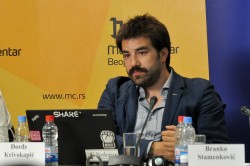Session 8: Opening Democracy for Citizens: Open Government Partnership
(in partnership with UNDP Regional Centre for Europe and the CIS)
Chatham House Rule
Discussion Points
- Is it too early in the game?
- Or have new forms of control already matched this rise in possibility?
- And if so, who is calling the shots and who is participating?
Background
Open government platforms and the global rise of open data create space for greater transparency and, combined with the availability of new technologies, enable an easier access to processes, as well as empower citizens to make informed decisions and choices. An important factor in these developments is the democratization of technology, enabling citizens to connect at lower cost and faster speed than ever before. Citizens have contributed to addressing major developmental challenges, including migration and disaster crisis. However, the openness agenda, be it within OGP or open data, is offset by greater concerns for privacy in a highly connected global society.
The openness agenda, which uses a digital medium, has expanded to a global scale. In the 5 years since its establishment in 2011, the OGP has grown to 70 participating countries. OGP and the overall openness agenda continues to contribute to enhanced transparency and anti-corruption, digital commons and civic tech eco-systems, strengthened access to information and enabled the development of open data. Equally as important, the OGP enabled the creation of a new platform for collaboration between governments and civil society. In the ECIS alone, 11 countries committed to open data at the national level and many more engage gradually; however, use and quality remain a challenge.
These types of international developments are matched by local paradigm shifts in how citizens relate with governments and make decisions, enabled by the smart revolution. The availability of smart and affordable technologies has lead to a democratization of participation and influence in policy-making processes. Established power-relations and political processes are challenged and there are calls for renegotiating the social contract to reflect the new role of the citizen. The citizen is no longer only a passive receiver of services, but now a key contributor to the solutions, empowered by access to information, capacity to organize and input.
Among the many forces that challenge an open and essentially democratic global order powered by the spread of technology, two will be discussed at this session. Firstly, to what extent is the spread of opportunities to participate equitable? Secondly, how can we balance privacy with openness? The panelists will discuss whether availability and usability of smart technologies, despite their affordability, is correlated to socio-economic and demographic particularities. How can institutions, advocacy groups, activists and think tanks work hand in hand with citizens in redrawing the social contract, renegotiating power structures and achieving transformational change? Are these new tools creating opportunities to do so? Finally, with the amount of information available online and generated by users themselves, how can societies balance openness with privacy?
_______________________________________________________________________________
Selected Readings:





